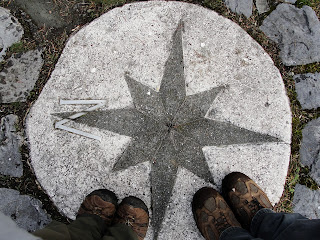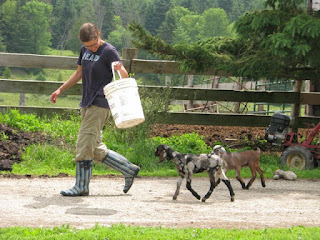Regular readers know that we got a small taste of housesitting in
Melbourne and
Honolulu back in 2014, and we recently spent the last eight months as "professional (unpaid) housesitters" around the Pacific Northwest. We got to explore new towns (
Corvallis and
Orcas Island here in the States,
Sundre and
Vernon up in Canada) as well as catch up on our previous hometown of
Portland. Our housesits averaged 4-5 weeks, except Portland where we were able to stay for three months last summer.
It's only June but we're already starting to think about what to do post-November, and housesitting has come up as an opportunity once again. Over the months we've heard many questions about how this whole housesitting thing works so we thought we'd answer a few FAQs, share our perspective on housesitting pros and cons, and (for those who are interested) offer some tips to get started.
That's a lot for just one blog post, so here's part one - FAQs and pros/cons...
~~~~~ FAQs ~~~~~
How did you find opportunities? Our Honolulu and Sundre housesits were at friends' places. We found all of the others through
Housecarers.com. For a small annual fee, you post your profile, housesitting preferences (length of stay, animal care experience, etc), a few references, and some pictures.
At that point you can search listings and message potential hosts who have posted ads describing their housesit opportunity. Hosts can also review profiles and reach out to you before they even post a listing - this is how we got our Portland gig.
awww... miss that sweet boy Rusty
Housecarers.com also allows you to set up notifications for postings in your geographic area of interest or general time frame, which is great because the sooner you reply to a posting, the better your chances.
(
Trusted Housesitters is the other web site we're sort of familiar with... I honestly can't remember why we chose Housecarers over Trusted Housesitters at the time.)
Where are the opportunities? It seemed that most of the opportunities under Housecarers.com were in Australia, New Zealand, Canada and the United States, which was perfect for us. A quick scan of Trusted Housesitters indicates that they might have a slightly wider geographic area. Definitely do your research on this before signing up for one site or the other - or just cover your bases and sign up for both. The membership costs are pretty minuscule compared to the money you'll save in the long run.
How long are the opportunities? Durations range anywhere from a single weekend to 6 months or more, with many other options in between. Sometimes hosts indicate that they don't know when they'll be back - lucky them!
What were the general responsibilities? All responsibilities should be clearly laid out in the host's posting. Feeding pets, walking dogs, watering plants/gardens, putting out the trash and recycling... Not burning the house down... Enjoying local hikes, supporting neighborhood cafes, taking advantage of the host's ample reading library or music collection or home fitness center... Those simple tasks were common across all our housesits.
Other tasks vary by your experience or ability. Because of our previous farm experience, we cared for chickens during two housesits and helped with farm chores during another housesit. Some opportunities we've seen don't involve pets at all. Others we've seen require more significant garden or home care.
with chickens come eggs... so there's that!
Did you get paid? Nope. (See "cons" below.) One host gave us a few ample gift cards to local stores, and another host who required a bit more animal care offered to pay us a small stipend but given their enormous vegetable garden that we had full access to, we declined.
As an aside, there
are paid housesitting gigs out there... if you know where to find them, please let us know!
~~~~~ Pros ~~~~~
You'll see more off-the-beaten-path places. Sure, we stayed in a thriving little neighborhood in Melbourne and a familiar neighborhood in Portland. But we also stayed in a quiet farmhouse in Corvallis and a quiet farmhouse in Sundre. And Vernon, British Columbia? Have you heard of this place?
Getting to and from successive housesits also took us through Montana, Calgary, Vancouver, Bellingham - places we've never been able to spend much time in the past.
Kootenai Falls suspension bridge - Libby, Montana
(But, that's something to consider - do you have transportation to get you places? Hosts may not be willing to pick you up, and once you get there, can you get around?)
You really live like the locals. We volunteered throughout the summer in Portland. We attended the annual Ukrainian Christmas party and junior league hockey games along with our neighbors in Vernon. We hiked almost all 38 miles of trails in Moran State Park on Orcas Island.
the west really IS the best
We shopped at thrift stores and farmer's markets, and sought out free events and good beer, everywhere we went. Basically, we transplanted how we lived in Portland for five years into each housesitting opportunity. It was awesome.
You can find longer-term opportunities, making leftovers a possibility. After living meal-to-meal for so long, believe me - this was HUGE. We froze pesto and berries in Portland. We dried heaps of tomatoes, apples, and pears in Corvallis. We made a surplus of wontons in Vernon. We enjoyed waffles for days and days on Orcas. HUGE.
wonton soup for you!
You get your pet fix without the long-term time and expense commitments of having a pet. We loved all our "temporary pets" - they all had their quirks, but they were all pretty sweet and we have fond memories of all of them. And? We were happy to have our freedom back when we left the housesit. (But we'd go back to each housesit in a heartbeat!)
You get to travel and settle down at the same time. Generally speaking, medium-term housesitting was a great way for us to take a breather and regroup after two years of international travel. It also gave us the dual benefit of roaming around
and settling in for a few weeks, so it was a gentler transition back to a more sedentary lifestyle.
~~~~~ Cons ~~~~~
You still spend money. We got by on about
$13/person/day while housesitting. (It doesn't sound like much on a day-to-day basis, but eight months equated to just under $6000, which is quite a bit when you are living off a travel budget with no income to replenish it!) We have no regrets about the money we've spent while housesitting but we definitely see that doing this long-term would be a much better arrangement for travelers who work from the road.
Locations can be isolating. This could be great if you're traveling solo while writing the next great American novel, but not-so-great if you crave social regular interaction. (Groceries and gas are also more expensive in the remote areas... just something to consider.)
It may not be as flexible as it sounds. Depending on the pet, you may not be able to get away for day or overnight trips - dogs have to be walked and fed, sometimes cats are on schedules too. And farm animals are definitely on a schedule!
We missed out on a few very intriguing hiking and sightseeing opportunities due to pet schedule limitations, but that's okay - they would've cost additional money, and now we have a reason to go back to those places someday.
It can be dreadfully boring at times. And I repeat: "Let's housesit in the mountains for the holidays!" "Seeing that part of Canada in the winter will be great!" "Getting snowed in, watching movies and reading books all day, hanging out in the hot tub - it'll be fun!" ... said no sane person ever.
I suppose it sounds awesome if you work 40+ hours a week, 50 weeks out of the year, but after one week of our five-week Vernon stay, I was done.
Your hosts' priorities may not match yours. Cleanliness, energy efficiency, recycling, how the hosts have equipped their kitchen... These have all been minor issues as we've gone from home to home.
For me, the cookware was the biggest challenge. We ended up traveling with multiple coffee pots and basic kitchen supplies, which took up more car space than one would expect!
~~~~~ Up Next ~~~~~
So there's some food for thought... Our next post will feature some tips for those of you considering this as a way to extend travel or just to see another part of your home state or country for a little while. If you've tried housesitting and have anything to add, please leave a comment!




















































